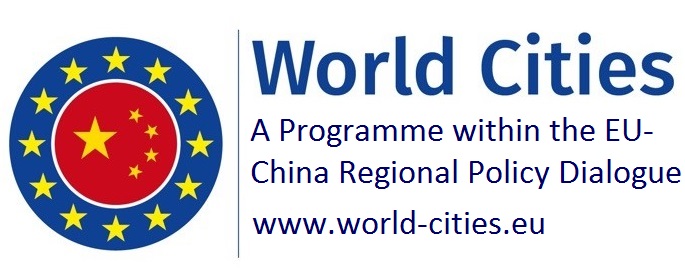 China, a country more than twice in size and population than the European Union, has undergone an unparalleled development boom in the last decades. Thanks to China’s economic reforms, five hundred million people have been lifted from poverty in the last thirty-five years[1]. Nevertheless, reforms have also increasingly led to an uneven distribution of income and evermore-critical environmental problems. Cities are affected by enormous economic and social contrasts due to rapid economic development and a high influx of people from rural areas. Spatial development disparities are evident in many ways. Prosperous metropolitan regions and cities contrast with underdeveloped rural areas. Cities – particularly in the east and south of the country – continue to grow while rural areas in the west and north are increasingly being left aside. However, even more developed cities face growing development gaps. Whereas some metropolitan areas are becoming more attractive, some urban centres have to cope with emigration and brain-drain problems.
China, a country more than twice in size and population than the European Union, has undergone an unparalleled development boom in the last decades. Thanks to China’s economic reforms, five hundred million people have been lifted from poverty in the last thirty-five years[1]. Nevertheless, reforms have also increasingly led to an uneven distribution of income and evermore-critical environmental problems. Cities are affected by enormous economic and social contrasts due to rapid economic development and a high influx of people from rural areas. Spatial development disparities are evident in many ways. Prosperous metropolitan regions and cities contrast with underdeveloped rural areas. Cities – particularly in the east and south of the country – continue to grow while rural areas in the west and north are increasingly being left aside. However, even more developed cities face growing development gaps. Whereas some metropolitan areas are becoming more attractive, some urban centres have to cope with emigration and brain-drain problems.
In order to cope with these challenges, China’s National Development and Reform Commission (NDRC) has launched a series of measures in the last five-year plans. NDRC – that has been partner of the European Commission DG REGIO since 2006 – is committed to further developing its systematic regional development scheme at national, provincial and local level. The European Union’s cohesion policy provides valuable experiences in a wide range of issues like institutional management (multi-level governance), financial engineering, sustainable and balanced development as well as inclusive growth.
In 2010, the European Commission launched CETREGIO, a Chinese European Training / Twinning Series on Regional Policy. CETREGIO did not intend to provide European tailor made solutions for the Chinese realities but rather to offer Chinese regional experts a source of reference when setting their own regional development policies. Moreover, the programme aimed at strengthening linkages between European and Chinese regions that can be used for the further development of decentralised cooperation.
Training consisted of information sessions and twinnings schemes in Europe Union member states and China. Programmes included lectures and field visits to best practices on selected focus areas. Between 2010 and 2014, over 200 Chinese decision makers from all 33 provinces and autonomous cities/regions were able to share experiences and to visit best practices in more than 45 regions of 17 European Union member states representing its geographical diversity.
The twinning sessions have covered a wide range of regional development issues including regional policy legislation; statistical information systems; innovation and clusters; territorial cohesion; urban-rural linkages, sustainable urban development and peri-urban development. Chinese delegates are mostly senior experts in their respective areas and represent the vast diversity of regional development in China. They all have shown strong commitment with the training activities, facilitating vivid discussions with the European colleagues and thus deepening decentralised cooperation among regions and cities.
In introductory and follow-up seminars conducted since 2012 in China, dozens of experts from Austria, Belgium, Poland, Slovakia, Italy, Ireland, the UK, Netherlands, Spain and Germany have also been able to visit best practices in several Chinese regions and cities (Beijing, Tianjin, Guangzhou, Guangxi, Chengdu, Wuhan, Sanming, etc).
CETREGIO also aimed at establishing close linkages between European and Chinese companies and industrial clusters. The programme also contributes to supporting the EU-China Partnership on Urbanisation (official website here)
CETREGIO was implemented 2010 by the Academy of European Law with support of the EU-China Policy Dialogue Support Facility (PDSF) and from 2011 to 2014 by GIZ International Services (GIZ).
Since 2015, CETREGIO is part of the World Cities China project, implemented by GIZ.
For further information, please visit the website of the European Commission, DG REGIO:
http://ec.europa.eu/regional_policy/cooperate/international/index_en.cfm
[1] See EU-China Regional Policy Study. DG REGIO, 2011.

